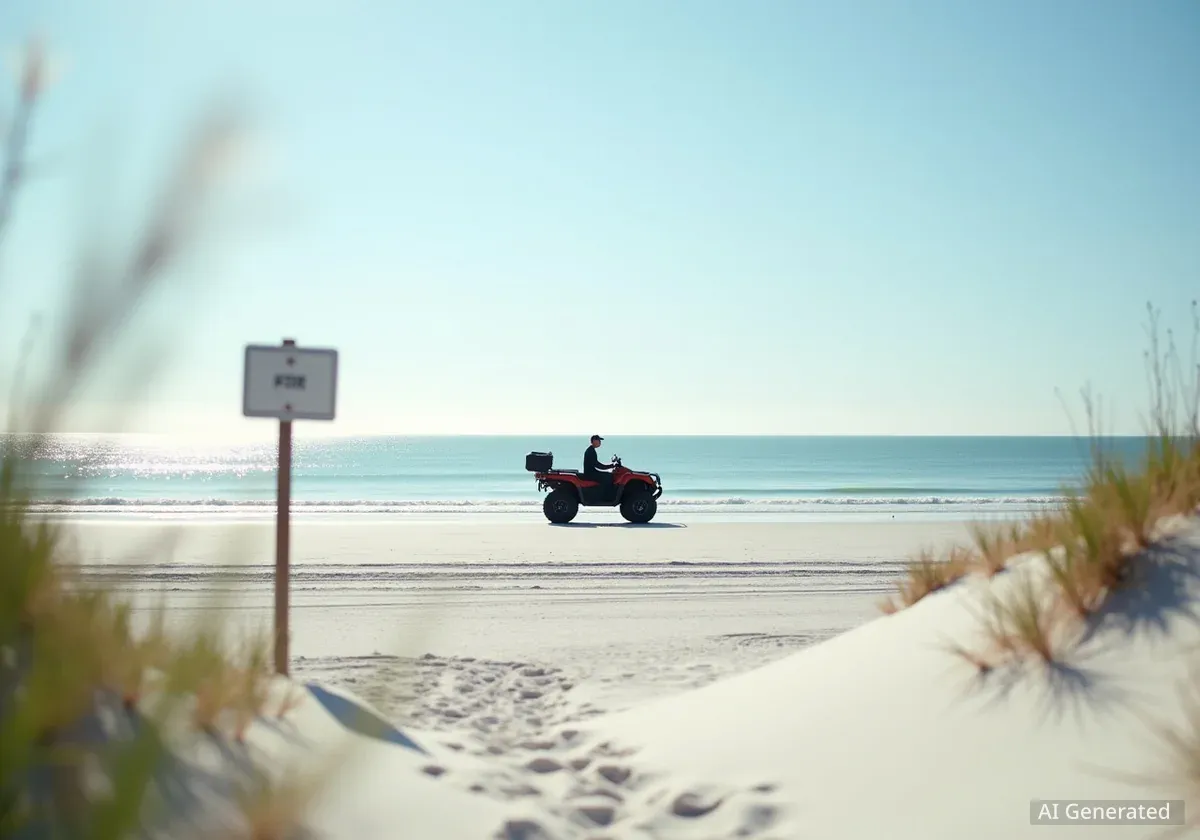A five-month legal dispute over beach driving at American Beach in Florida has concluded with a mediated settlement. While the agreement does not end vehicle access, Nassau County has committed to several measures aimed at mitigating environmental impact and enhancing safety. This resolution follows a lawsuit filed by the nonprofit organization Save Historic American Beach (SHAB) under the Endangered Species Act.
Key Takeaways
- Beach driving will continue at American Beach, Florida.
- Nassau County agreed to new enforcement and conservation measures.
- The settlement was reached after a lawsuit by Save Historic American Beach.
- New rules include a 10-foot conservation zone and relocation of access.
- Shark fishing will be prohibited in beach driving areas.
Settlement Reached in Beach Driving Dispute
Nassau County and the nonprofit Save Historic American Beach (SHAB) signed a mediated settlement agreement on September 17, 2025. This agreement resolves a lawsuit brought by SHAB against the county. The lawsuit was filed to protect sea turtle nests and other wildlife from the effects of vehicles on the beach.
The legal action began five months ago. SHAB sought to completely stop vehicles from driving on American Beach. A judge ordered both parties into mediation in July to find a compromise. The resulting agreement represents a partial victory for environmental advocates.
Concessions from Nassau County
While beach driving and parking will not cease, Nassau County has agreed to implement several measures. These actions are designed to reduce dangerous conditions and protect the coastal ecosystem. The county will focus on enforcing existing regulations and establishing new protective zones.
Fact: Endangered Species Act
The Endangered Species Act (ESA) is a United States law passed in 1973. Its purpose is to protect critically imperiled species from extinction as a "consequence of economic growth and development untempered by adequate concern and conservation." It provides a framework to conserve and protect endangered and threatened species and their habitats.
New Rules for American Beach Access
The settlement outlines specific actions Nassau County will take. These measures address concerns raised by SHAB regarding environmental protection and public safety. Implementing these changes will require both enforcement and administrative efforts from the county.
One key aspect of the agreement involves stricter enforcement of current access rules. Only Nassau County residents, disabled users, and active-duty military personnel are permitted to drive on the beach. The county will now accurately record the names and license numbers of all vehicles entering at Lewis Street.
Traffic Management and Conservation Efforts
To relieve pressure on American Beach, the county will enforce a 1989 law (Senate Bill 1577). This law allows driving on the southern end of Amelia Island, from Nassau Sound to developed resort areas on the Atlantic Ocean side. This enforcement aims to redirect some vehicle traffic.
A significant environmental protection measure is the establishment of a 10-foot conservation zone. This zone will run from the permanent vegetation line. The county has committed to reviewing this demarcation at least once a year. This helps protect dunes and nesting areas.
Background on American Beach
American Beach, located on Amelia Island, has historical significance as a resort community founded in 1935 for African Americans during the Jim Crow era. It is known for its natural beauty and diverse wildlife, including nesting sea turtles. The conflict over beach driving balances recreational access with environmental preservation.
Future Changes and Prohibitions
Nassau County will also seek permits to move the beach vehicular access point. The goal is to relocate it from Lewis Street to Burney Park as quickly as possible. This move could improve traffic flow and access management.
Furthermore, the settlement prohibits personal property items from being left on the beach overnight. This is a requirement under Ordinance 23 ½ – 25(b) and helps keep the beach clear for wildlife and maintenance. This rule is crucial for protecting vulnerable species, especially during nesting seasons.
Ending Shark Fishing and Continued Advocacy
One notable prohibition included in the settlement is ending shark fishing at American Beach. Operating commercial businesses in beach driving areas is already prohibited, and this measure reinforces that policy. This step aims to protect marine life and ensure public safety.
"We firmly believe, and have proof, that beach driving threatens our delicate coastal ecosystem and harms endangered sea turtles and other wildlife," said Mark Dawkins, president of SHAB. "We are encouraged by the county’s acknowledgement of our concerns, and we will continue to support all efforts that seek to end beach driving at American Beach."
Despite the agreement, SHAB expressed dissatisfaction with the overall outcome. The organization's spokesperson stated that the fight is not over. SHAB plans to continue supporting other efforts to end driving on American Beach. They maintain their position that vehicles pose a threat to the coastal environment.
The settlement represents a compromise. It allows beach driving to continue but introduces new rules and enforcement. These changes aim to balance recreational activities with environmental conservation. The long-term impact of these measures on American Beach's ecosystem will be monitored.
- Enforce access restrictions: Limit entry to Nassau County residents, disabled users, and active-duty military.
- Record vehicle information: Accurately log names and license numbers at Lewis Street.
- Enforce 1989 law: Direct traffic to the southern end of Amelia Island.
- Establish conservation zone: Maintain a 10-foot buffer from vegetation line, reviewed annually.
- Relocate access: Seek permits to move vehicle entry from Lewis Street to Burney Park.
- Prohibit overnight property: Enforce Ordinance 23 ½ – 25(b) for beach cleanliness.
- End shark fishing: Prohibit this activity in beach driving areas.





